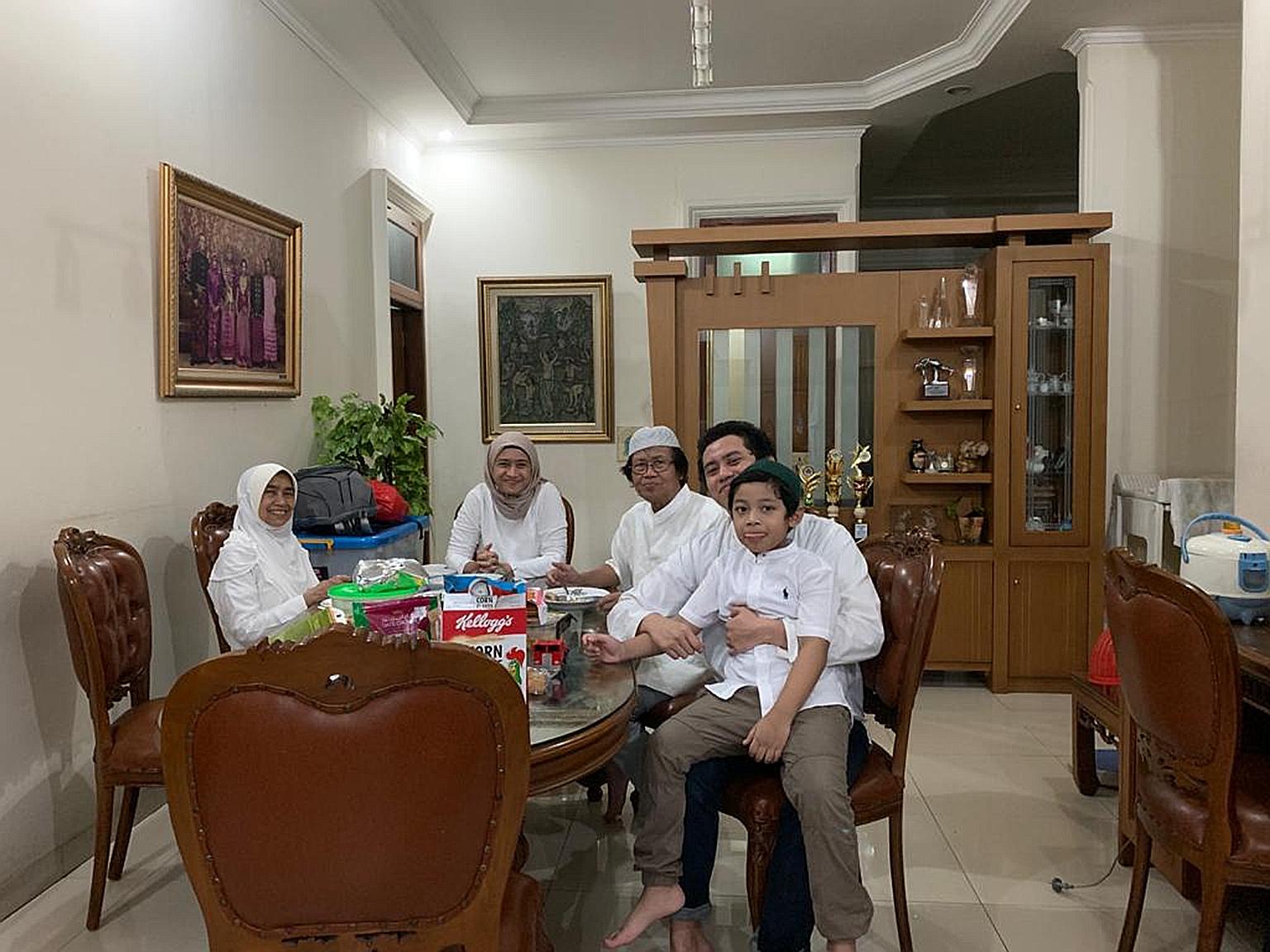Coronavirus pandemic
A different Hari Raya for Indonesia's healthcare workers
They avoid hugging loved ones and returning to home towns for fear of spreading the virus
Sign up now: Get insights on Asia's fast-moving developments

Dr Galoeh Adyasiwi (second from left) with her parents, elder brother and son in Jakarta yesterday. Her husband, who works in South-east Sulawesi, could not fly in to celebrate Hari Raya with her.
PHOTO: COURTESY OF GALOEH ADYASIWI
Linda Yulisman Indonesia Correspondent In Jakarta, Linda Yulisman
Follow topic:
Even though they live under the same roof, Dr Galoeh Adyasiwi could not hug or kiss the hands of her parents, a tradition during Hari Raya Aidilfitri.
She also has to skip visiting her mother-in-law, at whose place her husband's extended family usually gather for the festive occasion.
"Many older family members are there and it will be risky if I go. I'm afraid of becoming a carrier of the virus," the resident pulmonologist at Persahabatan General Hospital Jakarta, a Covid-19 referral hospital, told The Straits Times.
For the first time, Dr Galoeh celebrated Hari Raya without her husband, who could not fly to the capital from Kolaka, South-east Sulawesi, where he works in a state-owned bank. The couple, who have a seven-year-old son, had a reunion virtually via video call.
"At least I was also off-duty on Hari Raya eve, so I could spend time with my family and enjoy delicious ketupat (rice cake) and opor (chicken in coconut broth)," said the 34-year-old doctor.
Every year, more than 20 million Indonesians travel back to their home towns by air, sea and land at the end of the fasting month of Ramadan in a massive exodus, known as mudik, to celebrate Aidilfitri.
But this year, the government of the world's biggest Muslim-majority nation of around 270 million banned mudik amid large-scale social distancing measures to curb the spread of the coronavirus that causes Covid-19. The disease has killed nearly 1,400 and infected more than 22,000 in Indonesia.
The authorities have also urged Muslims to pray at home rather than at the mosques, which is the usual tradition.
In an address to the nation on Saturday, President Joko Widodo reminded Indonesians that the restrictions were absolutely necessary.
"I feel this is very hard, but the safety of our friends and relatives is certainly more important and must become our priority," he said.
Ms Susanti, a nurse at Premier Bintaro Hospital in South Tangerang, Banten, could not return to her home town in Lampung on Sumatra island. Visiting her grandmother and relatives in the nearby town of Serang was also not an option.
Similarly, Ms Linda Winarsih, a nurse at a Jakarta-based Covid-19 referral hospital, could not return home to Tegal in Central Java to be with her parents as well as her fiance, with whom she was supposed to prepare for their wedding in August. She also refrained from visiting relatives in Jakarta who could not return home.
But the 24-year-old took solace in joining prayers at a nearby mosque in Bekasi, West Java. About 100 people, who passed temperature checks and wore masks, attended the prayers despite official advice not to do so. Worshippers kept a safe distance and did not shake hands.
Last week, under the hashtag #IndonesiaTerserah (Whatever Indonesia), social media users, including doctors and nurses, expressed frustration with the government's inconsistent policy responses to the Covid-19 pandemic and with the attitude of many Indonesians who flout the social distancing measures.
Noting that non-compliance with the stay-home rule could lead to continuing infections and "endless battle", Ms Susanti said: "Many people are getting bored staying home. In contrast, we health workers really want to be at home with our family.
"We hope this pandemic will end soon so we can meet our family again."

